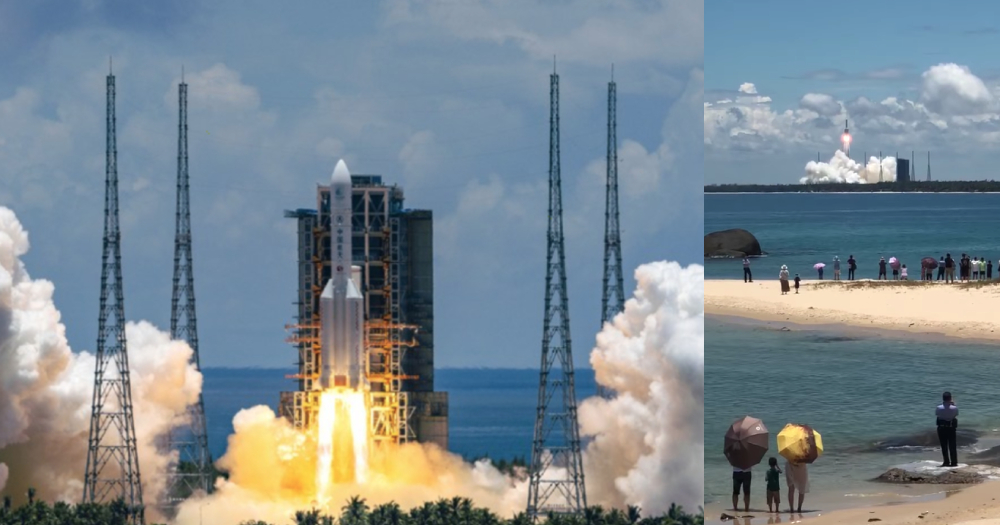China successfully launched a rocket from Wenchang city in Hainan province last Thursday, July 23.
Rocket took off amid cheers from locals
Onlookers cheered as the rocket, Tianwen-1, blasted off, leaving behind a flurry of smoke.
36 minutes after it took off at 12:41pm local time, the rocket entered its planned trajectory to Mars.
If things go according to plan, Tianwen-1 will be the country's first successful mission to the red planet.
Only the United States and the Soviet Union have managed to succeed in their Mars missions.
China's previous failed attempt was in 2011, when it could not leave the Earth's orbit.
Tianwen-1 is the first Chinese-made rocket that managed to get past the Earth's atmosphere.
The Mars mission aims to conduct a global survey of the planet, and bring samples back to Earth.
The Administrator of United States government agency NASA (National Aeronautics and Space Administration), Jim Bridenstine, congratulated China on its successful mission.https://twitter.com/JimBridenstine/status/1286177196491575297
July good month for Mars missions
China's Mars mission is one of the few that were planned to take place in the month of July.
The United Arab Emirates successfully launched its probe from Japan on July 20.
We have lift-off. H2A, the rocket carrying the Hope Probe to space, has launched from the Tanegashima Space Centre in Japan.#HopeMarsMission pic.twitter.com/pRKZLOL7NT
— Hope Mars Mission (@HopeMarsMission) July 19, 2020
NASA is set to send a rover to Mars on July 30.
The Mars missions were all planned in the month of July as this is the only time in 26 months when Mars is the closest to Earth, making trips to the planet relatively shorter.
According to Spaceflight Now, all three missions are scheduled to reach Mars in February 2021.
A joint mission between European Space Agency and Russia's State Space Corp. Roscosmos was originally planned to join them as well, but was ultimately postponed to 2022 due to difficulties brought about by the Covid-19 pandemic.
Ambitious plan
According to Bloomberg, what sets China's Mars mission apart from others is also the fact that the Chinese is sending an orbiter, a lander and a rover all at once, which is "not what other countries do when they try to explore Mars".
The successful launch of the rocket was seen as a great achievement for China.
A headline on the news from state-controlled media outlet Global Times reads: "China's successful launch of Mars mission heralds new era of deep-space probes beyond the Moon".
China was also the first and only country to have successfully landed a probe on the far side of the moon last year.
Not easy with a Mars mission
However, the task is not without its challenge.
Acknowledging the difficulties involved in the Mars mission, official state-run media Xinhua said the planet "poses new difficulties" for Chinese spacecraft designers.
This is because landing on Mars is harder than landing on the moon. While the planet has an atmosphere, the moon does not have one, which makes it relatively less complicated to get a craft down on the moon's surface.
Xinhua also pointed out that while the distance from Earth to the moon is about 380,000 kilometres, the distance from Earth to Mars is up to 400 million kilometres, making communication and control difficult.
In addition, probe designers have to contend with and try to minimise the risk of damage by sand and dust.
China's space ambitions a throwback to Cold War-era Space Race?
China plans to build a permanent space station of its own by 2022.
The country has been barred from the International Space Station since 2011, when Congress passed a law banning official American contact with the Chinese space program, citing national security concerns.
China also plans to explore an asteroid and a comet.
Blaine Curcio, founder of Orbital Gateway Consulting in Hong Kong, told Bloomberg that China's space missions indicate that the world is facing something similar to the Cold War-era Space Race between the U.S. and Soviet Union, where both superpowers were looking for "bragging rights".
The Mars mission does not constitute "a big strategic advantage" for China, and "not a lot of business" is involved, he said, adding that it is about "prestige".
Top image via Cai Yang/Xinhua
If you like what you read, follow us on Facebook, Instagram, Twitter and Telegram to get the latest updates.
